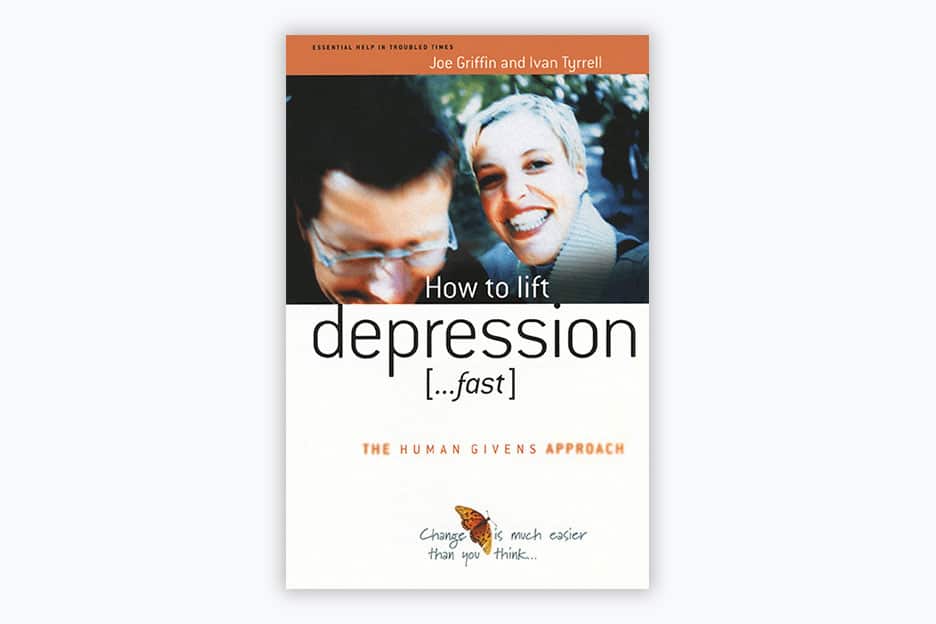ENA survey helps target effective support during the pandemic
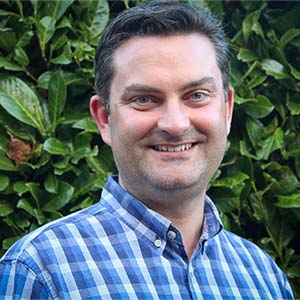
Jon Neal - CEO at Suffolk Mind
We caught up with Jon Neal, CEO at Suffolk Mind, to discover what their regular ENA survey has told them about the impact of the pandemic on the county’s mental health – and how they’ve been able to use their research findings to make a real difference.
Suffolk Mind has been using the HG approach since 2011. They find that its organising framework gives them structure and direction – and the clarity and accessibility of the needs and resources model mean it is welcomed by the organisations they work with.
Every aspect of their work employs HG therapeutic techniques, from storytelling to 7:11 breathing – and they regularly survey the wellbeing of their community through an ongoing Emotional Needs Audit.
As Suffolk Mind started collecting data through their version of HG’s ENA back in 2019, they have been able to gain unique insights into how well their communities have felt they are meeting their emotional needs (and their physical needs for sleep, a healthy balanced diet and regular exercise) throughout each twist and turn of the pandemic. In addition to an overall measure, they have identified which groups have been experiencing the most significant changes in their ability to meet their needs and which needs they feel they have – and have not – been meeting well. “The findings have helped us to develop practical strategies, highlighting where to spend budget. If they are well targeted, small projects can really make a big difference,” Jon says.
The findings help us develop campaigns that achieve maximum impact…
When data from May 2020 – during the first lockdown – revealed that more than half of Suffolk residents were not sleeping well, Suffolk Mind responded quickly, developing clear, practical resources, including tips and videos, to help people to improve their sleep and meet this essential need.
“Sleep is often the first thing to go when someone is struggling with their mental health. Getting the right balance between dream sleep and other types of sleep, including deep recuperative sleep, can be affected by how well you are meeting other key emotional needs,” Naomi Simons, Research and Evaluation Manager, points out. The survey showed that under 25s (87% of those surveyed), those in full time work (85% of those surveyed) and people unable to work (78% of those surveyed) were the most affected and so efforts were focused on these groups. Suffolk Mind also created and shared videos offering advice on how to continue to meet each emotional need, through the ongoing pandemic.
The survey results also highlighted a dramatic reduction in how well respondents were meeting their emotional needs for status, meaning and purpose, community and receiving attention. “These findings were used to inform a conversation with other local organisations within the East and West Suffolk Alliances about how the population was responding,” Jon says. He shared a presentation in which he used the example of a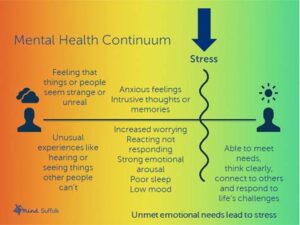
Together Suffolk Mind and the other organisations in the Alliances developed the “Suffolk Says Thanks” initiative to help everyone to feel 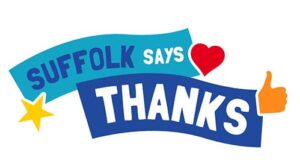
The survey results showed the huge impact the first lockdown and pandemic had had…
By August 2020, Suffolk Mind could see, through their survey results, the huge impact the first lockdown and the pandemic had had on their community. “Nearly half of people in Suffolk (46.3%) were not meeting their emotional needs and were therefore liable to stress and potential mental health issues. In the year before lockdown, this figure was one in four people (24.2%),” Jon says. “We could see how important it was to encourage community groups to open up again as quickly as possible, or at least to share details of their upcoming plans to show people that there was hope on the horizon.”
Suffolk Mind created further resources and services – for individuals, organisations, children, families and employers – including a new support service for health and care staff across Norfolk and Suffolk to help them cope with the immense pressures of working during the COVID-19 pandemic, a blog offering practical tips to tackle loneliness, advice for people caring for others during the pandemic and exercise ideas.
As restrictions began to lift, Suffolk Mind again worked with their local Alliances, this time on a “Suffolk Says Welcome Back” campaign. “Again,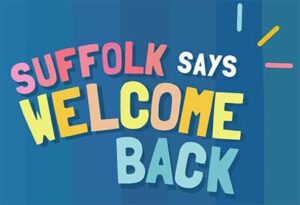
Some results were surprising…
“The research did reveal that some groups had experienced an improvement in their ability to meet their needs during the pandemic,” Jon says. Although the needs of people who were unemployed, for example, were still not well met, they felt they were better met during the pandemic than they had been before it, perhaps because of the greater sense of community they felt now that more people seemed to be experiencing a similar situation, through being furloughed or suffering job insecurity.
People in the age groups 35-44, 45-54 and 55-64 also reported feeling their needs were better met during the pandemic. They gave higher scores to meeting their needs for receiving attention, to autonomy and control and to status.
Looking ahead …
In its latest ENA-based report, Suffolk Mind has taken a look back across 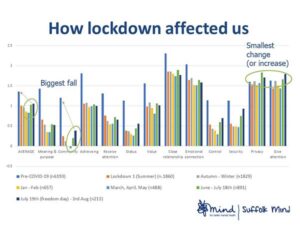
Suffolk Mind’s research means they will focus their efforts this Autumn on supporting people in meeting their needs for community, meaning and purpose and value. They have recently launched a new initiative, “Take Notice”, which encourages people to take notice of how well they are meeting their emotional needs – and shares a range of helpful strategies and techniques. You can follow it on their social media platforms (links can be found here).
> You can read more about Suffolk Mind and how they use the HG approach every day in their vital work here.
The Emotional Needs Audit
The survey uses Qualtrics software and asks participants to answer 15 short questions which provide a snapshot of how well they feel each of their emotional needs, and their physical needs for sleep, exercise and a balanced, healthy diet, are being met.
Participants are asked to give their answers on a scale of -3 to 3, with -3 being “not at all” and 3 being “very much so”, and they are also invited to provide information about their age, gender, economic status (for example, whether they are self-employed, unable to work, student, retired), the industry they work in, their sexual orientation, their marital/civil status and, more recently, whether or not they have had contracted COVID-19 or are suffering with long COVID.
People are encouraged to complete the survey through the Suffolk Mind website, during training programmes and through the organisation’s social media platforms.




